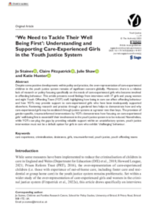Despite some positive developments within policy and practice, the over-representation of care-experienced children in the youth justice system remains of significant concern globally. Moreover, there is a relative lack of research or policy focusing specifically on the needs of care-experienced girls who become involved in offending behaviour.
This article presents novel findings from interviews with 17 girls and young women and eight Youth Offending Team (YOT) staff, highlighting how being in care can affect offending behaviour and how YOTs may provide support to care-experienced girls who have been inadequately supported elsewhere. Reviewing research and practice through a gendered lens helps to demonstrate how and why care-experienced girls may be escalated through justice systems at a greater rate than boys.
The provision of gender-specific, trauma-informed interventions by YOTs demonstrates how focusing on care-experienced girls’ well-being first is essential if their involvement in the youth justice system is to be reduced. Nonetheless, while YOTs can plug the gaps by providing valuable support within an unsatisfactory system, youth justice intervention must not be a default option for girls in care who exhibit ‘challenging’ behaviour.

